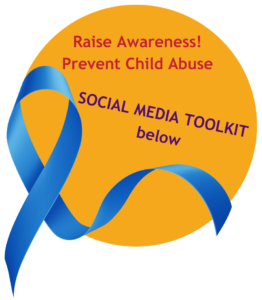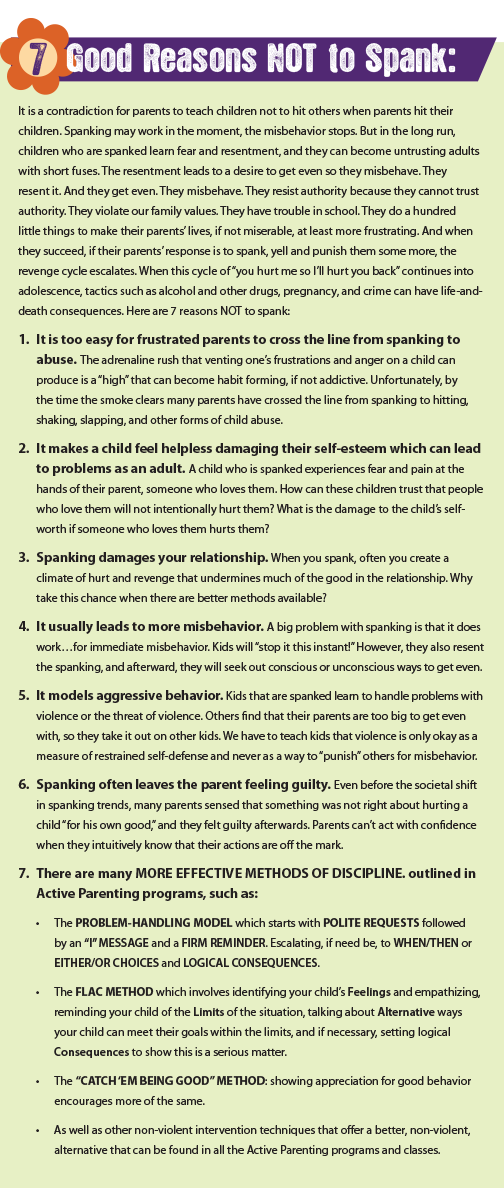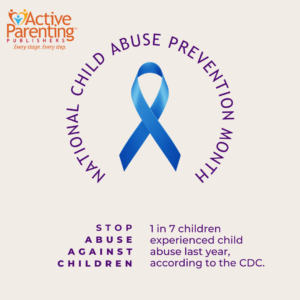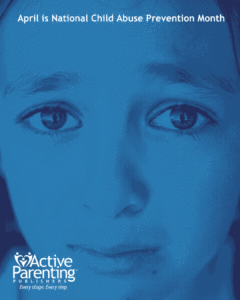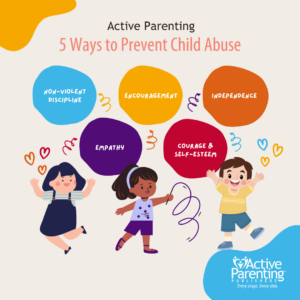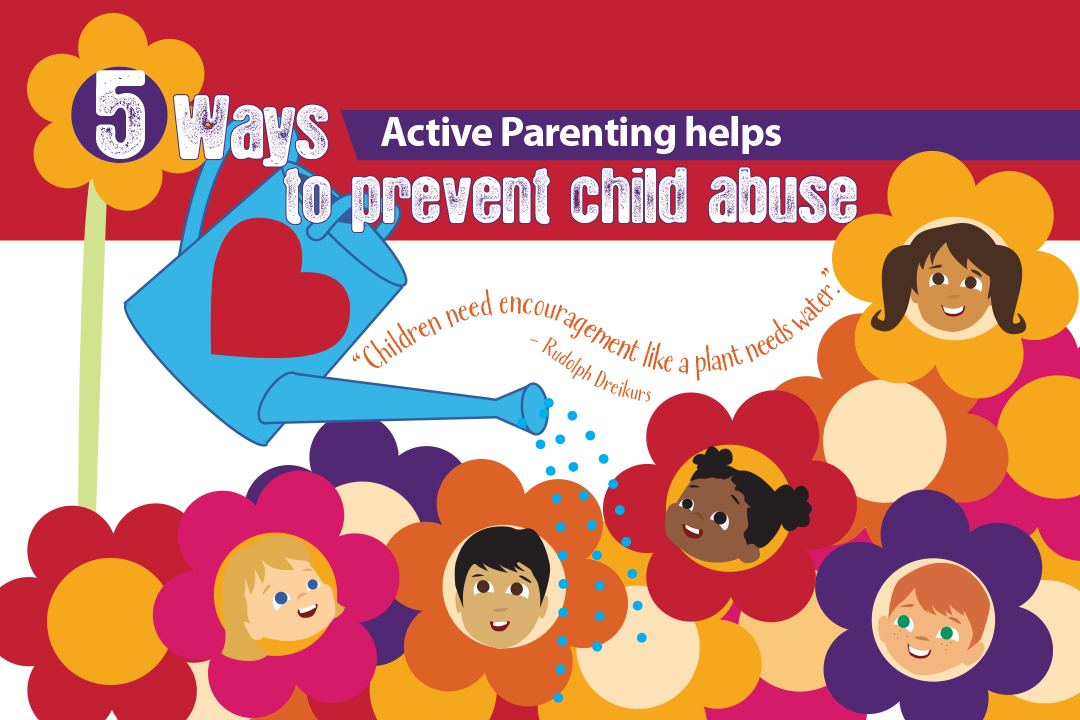
03 Apr Five Ways Active Parenting Helps to Prevent Child Abuse
Active Parenting Helps to Prevent Child Abuse 
Active Parenting Helps to Prevent Child Abuse by providing parents with the tools they need to communicate and empathize with their children, foster independence and mutual respect, provide encouragement, and employ methods of non-violent discipline. These tools help to build the parents’ own courage and self-esteem and lead to more positive relationships.
There are different types of child abuse (source: CDC):
- Emotional abuse: name-calling, shaming, rejecting, withholding love, threatening or behavior that damages a child’s emotional well-being or self-worth.
- Neglect: failure to meet a child’s basic physical needs such as housing, food, clothing, education, and access to medical care. Neglect includes failing to meet a child’s emotional needs such as having feelings validated and responded to appropriately.
- Sexual abuse: forcing or manipulating a child to engage in sexual acts or exposing a child to sexual activities.
- Physical abuse: hitting, kicking, shaking, burning, or any use of force against a child that can result in injury.
According to the CDC, 1 in 7 children experienced child abuse or neglect last year. 90% of abuse is committed by someone the child knows. 68% of victims are abused by a family member as reported by childprotect.org. “Around 60% of children aged 2–14 years regularly suffer physical punishment by their parents or other caregivers” globally according to the World Health Organization.
Why do some parents physically abuse their children?
The short answer is that it is an interaction effect brought about by a number of risk factors, including:
- outside stress (more stress equals shorter fuses)
- psychological issues in the parent (“unresolved anger” from old wounds, often the parent’s own childhood abuse)
- the child’s temperament (some kids are just more challenging than others)
- the parent’s attitudes about parenting; and the parent’s parenting skills
How can we prevent child abuse?
The CDC cites enhanced parenting skills that promote healthy child development as an effective way to prevent child abuse. The following are five of the ways that an Active Parenting class can help prevent child abuse by improving the attitudes and skills that parents bring to the parenting process.
- Active Parenting teaches parents an authoritative style of parenting.
Many parents believe in the use of corporal punishment (spanking) as an effective form of discipline. This attitude says children must be spanked into submission for their own good can escalate into psychological or physical abuse when a parent becomes angry and stressed over other issues in their lives. Teaching parents a model of parenting based on mutual respect and participation, the Active Parenting programs include non-violent discipline methods that correct misbehavior without the risk of morphing into abuse. In Active Parenting 4th Edition, parents are not only taught seven good reasons NOT to spank, but also skills such as logical consequences, “I” Messages, problem-solving, and other non-violent intervention techniques that offer a better, non-violent, alternative. The bottom line is that corporal punishment is a risk factor for abuse. It is an unnecessary risk because there are many effective forms of non-violent discipline.
- Active Parenting teaches parents how to encourage, rather than discourage, children.
One of the pioneering parent educators of the 20th century, Rudolf Dreikurs, once famously said that “children need encouragement like plants need water.” In addition to strengthening an attitude of encouragement in parents, Active Parenting teaches concrete parenting skills within parenting classes for how to encourage and motivate children. This means learning to increase positive comments that “build on strengths” (vs.focusing on mistakes); “showing confidence” in their child (vs. expecting too little); “valuing the child as he or she is” (vs. expecting too much). This is particularly important when considering that “inappropriate expectations of children” is another variable that has been linked to the risk of child abuse. A child growing up in an environment of encouragement is not only motivated to listen to their parents but also feels validated and loved so there is no need to act out. Less misbehavior leads to less need for discipline. Parents can use more effective forms of non-violent discipline taught in all the Active Parenting programs when discipline is needed. - Active Parenting teaches parents how to foster independence in children.
The “Active” style of parenting is based on the concept of “freedom within limits.” It teaches parents to empower children through such methods as choice, participation, and problem-solving within limits that are appropriate for their age and level of development. This method fosters independence that grows with the child. The “Dictator” style of parenting focuses on restricting a child’s power and independence through tight, limit-setting discipline that can escalate into abuse. The “Dictator” DEMANDS obedience and control through fear. The “Doormat” style of parenting overcompensates by being overly protective and regularly doing for the child what the child can do for herself which robs a child of power and independence. The “Doormat” HOPES for cooperation. The solution is the balance of the “Active” parent who employs expanding “freedom within limits” to raise children who grow into independent, confident adults who love and respect themselves and others. In this way the “Active” parent TEACHES cooperation. - Active Parenting teaches parents how to empathize with children.
“Low level of parental empathy towards children” is another risk factor of child abuse. Active Parenting is based on Adlerian theory, which might be seen as the predecessor to what is now called “cognitive-behavioral” theory. Adlerian theory has always been supplemented in Active Parenting programs with skills derived from communications theory and relationship-building training. The emphasis on teaching parents to identify and respond to children’s feelings is coupled with empathy-building activities to teach parents this essential parenting skill. New science on brain research shows that empathy (the experience of feeling what another person is feeling) releases the hormone oxytocin in both parent and child. This hormone, sometimes called the bonding hormone, creates a sense of well-being and trust. As such, empathy is a counter to stress that produces the hormone, Cortisol. Prolonged stress, such as is often suffered by abused children, can damage brain functioning and reduce the child’s ability to effectively handle stress. An adult who can handle stress effectively is less likely to solve problems with violence and more likely to continue the cycle of non-violent discipline with their own children and so on. - Active Parenting builds the parents’ own courage and self-esteem.
Active Parenting does not claim to be therapeutic, but it does build character in both parents and children. Parents learn methods and attitudes that promote the building of responsibility, cooperation, mutual respect, courage, self-esteem, and more in their children. It is not surprising that some of these lessons are also “caught” by the parents themselves. As one parent put it, “Active Parenting not only made me a better parent. It made me a better person.” Seeing oneself as improving is a hallmark of self-esteem (holding oneself in high esteem). Parents who see themselves as improving their parenting skills and themselves, in general, are less likely to become discouraged. Such parents are less likely to turn to abuse when their children’s behavior becomes stressful.
RAISE AWARENESS WITH OUR PREVENT CHILD ABUSE SOCIAL MEDIA TOOLKIT
Help raise awareness for child abuse prevention with these free tools you can download and share on Social Media.
MORE RESOURCES:
- FOR CHILDREN: Rules for Safety (poster and coloring & activity book from SafePath Children’s Advocacy Center)
- FOR TEENS: Teen Dating Safety (from SafePath Children’s Advocacy Center)
- FOR PARENTS: Information/Safety Information (from SafePath Children’s Advocacy Center)
- CDC: Preventing Child Abuse and Neglect
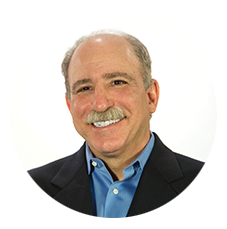 Active Parenting Publishers founder and president
Active Parenting Publishers founder and president
Michael H. Popkin, Ph.D. has been providing
research-based education programs with an
emphasis on nonviolent discipline, mutual respect,
and open communication for over 35 years. He is
widely known for his expertise in the field of parent
education and has appeared on over 100 TV programs,
including CNN and The Oprah Winfrey Show.
STAY IN TOUCH!
Click here to receive the latest news and offers from Active Parenting! And follow us on social media:

